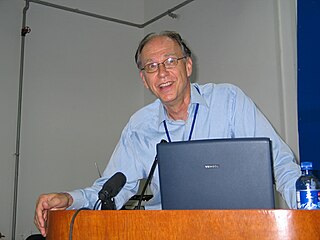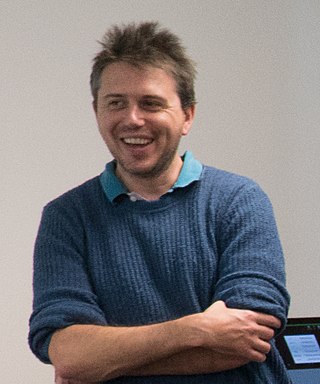
Linus Carl Pauling was an American chemist, biochemist, chemical engineer, peace activist, author, and educator. He published more than 1,200 papers and books, of which about 850 dealt with scientific topics. New Scientist called him one of the 20 greatest scientists of all time. For his scientific work, Pauling was awarded the Nobel Prize in Chemistry in 1954. For his peace activism, he was awarded the Nobel Peace Prize in 1962. He is one of five people to have won more than one Nobel Prize. Of these, he is the only person to have been awarded two unshared Nobel Prizes, and one of two people to be awarded Nobel Prizes in different fields, the other being Marie Curie.

Cell is a peer-reviewed scientific journal publishing research papers across a broad range of disciplines within the life sciences. Areas covered include molecular biology, cell biology, systems biology, stem cells, developmental biology, genetics and genomics, proteomics, cancer research, immunology, neuroscience, structural biology, microbiology, virology, physiology, biophysics, and computational biology. The journal was established in 1974 by Benjamin Lewin and is published twice monthly by Cell Press, owned by Elsevier.
Robert Allan Weinberg is an American biologist, Daniel K. Ludwig Professor for Cancer Research at Massachusetts Institute of Technology (MIT), director of the Ludwig Center of the MIT, and American Cancer Society Research Professor. His research is in the area of oncogenes and the genetic basis of human cancer.

The Journal of Biological Chemistry (JBC) is a weekly peer-reviewed scientific journal that was established in 1905. Since 1925, it is published by the American Society for Biochemistry and Molecular Biology. It covers research in areas of biochemistry and molecular biology. The editor is Alex Toker. As of January 2021, the journal is fully open access. In press articles are available free on its website immediately after acceptance.
The American Society for Cell Biology (ASCB) is a professional society that was founded in 1960.

Molecular Biology of the Cell is a biweekly peer-reviewed scientific journal published by the American Society for Cell Biology. It covers research on the molecular basis of cell structure and function. According to the Journal Citation Reports, the journal has a 2012 impact factor of 4.803. It was originally established as Cell Regulation in 1989.

Michael Spencer Waterman is a Professor of Biology, Mathematics and Computer Science at the University of Southern California (USC), where he holds an Endowed Associates Chair in Biological Sciences, Mathematics and Computer Science. He previously held positions at Los Alamos National Laboratory and Idaho State University.

The American Society for Biochemistry and Molecular Biology (ASBMB) is a learned society that was founded on December 26, 1906, at a meeting organized by John Jacob Abel. The roots of the society were in the American Physiological Society, which had been formed some 20 years earlier. ASBMB is the US member of the International Union of Biochemistry and Molecular Biology.

Martin Lee Chalfie is an American scientist. He is University Professor at Columbia University. He shared the 2008 Nobel Prize in Chemistry along with Osamu Shimomura and Roger Y. Tsien "for the discovery and development of the green fluorescent protein, GFP". He holds a PhD in neurobiology from Harvard University.
Axel Meyer is a German evolutionary biologist and a professor of zoology and evolutionary biology at the University of Konstanz, Germany.
Trey Ideker is a professor of medicine and bioengineering at UC San Diego. He is the Director of the National Resource for Network Biology, the San Diego Center for Systems Biology, and the Cancer Cell Map Initiative. He uses genome-scale measurements to construct network models of cellular processes and disease.

Chris Sander is a computational biologist based at the Dana-Farber Cancer Center and Harvard Medical School. Previously he was chair of the Computational Biology Programme at the Memorial Sloan–Kettering Cancer Center in New York City. In 2015, he moved his lab to the Dana–Farber Cancer Institute and the Cell Biology Department at Harvard Medical School.
The Phycological Society of America (PSA) is a professional society, founded in 1946, that is dedicated to the advancement of phycology, the study of algae. PSA is responsible for the publication of Journal of Phycology and organizes annual conferences among other events that aid in the advancement of related algal sciences. PSA also helps fund the scientific database, AlgaeBase.

Alfonso Valencia is a Spanish biologist, ICREA Professor, current director of the Life Sciences department at Barcelona Supercomputing Center., of Spanish National Bioinformatics Institute (INB-ISCIII), and coordinator of the data pillar of the Spanish Personalised Medicine initiative, IMPaCT. From 2015-2018, he was President of the International Society for Computational Biology.

Christine Anne Orengo is a Professor of Bioinformatics at University College London (UCL) known for her work on protein structure, particularly the CATH database. Orengo serves as president of the International Society for Computational Biology (ISCB), the first woman to do so in the history of the society.
Narayanaswamy Srinivasan was an Indian molecular biophysicist and a professor and the head of Proteins: Structure, Function and Evolutionary Group at the Molecular Biophysics Unit of the Indian Institute of Science. He is known for his researches in the fields of computational genomics and protein structure analysis. An elected fellow of the Indian Academy of Sciences and the National Academy of Sciences, India, he is a J. C. Bose National fellow of the Department of Biotechnology and a recipient of the National Bioscience Award for Career Development of the Department of Science and Technology. The Council of Scientific and Industrial Research, the apex agency of the Government of India for scientific research, awarded him the Shanti Swarup Bhatnagar Prize for Science and Technology, one of the highest Indian science awards, in 2007, for his contributions to biological sciences.

John Stuart O’Neill is a British molecular and circadian biologist. O’Neill is currently a Principal Investigator at the MRC Laboratory of Molecular Biology in Cambridge, United Kingdom. His work focuses on the fundamental mechanisms that sustain circadian rhythms in eukaryotic cells.
Tadashi Fukami is an associate Professor of Biology and community ecologist at Stanford University. He is currently the head of Fukami Lab which is a community ecology research group that focuses on "historical contingency in the assembly of ecological communities." Fukami is an elected Fellow of the Ecological Society of America.

David G. Drubin is an American biologist, academic, and researcher. He is a Distinguished Professor of Cell and Developmental Biology at the University of California, Berkeley where he holds the Ernette Comby Chair in Microbiology.











